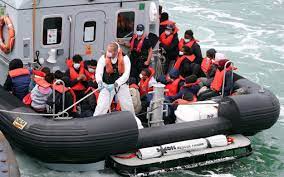The European human rights court granted last-minute injunctions to prevent the deportation of the few migrants on board, thus Britain’s first flight to Rwanda did not take off as planned on Tuesday.
Opponents, charities, and religious groups have slammed the British government’s decision to transfer some migrants to the East African country, calling it heartless. It has been compelled to launch a succession of legal challenges in London courts in order to keep the project from moving forward.
At least 30 people who were supposed to be on the first aircraft successfully argued that they should not be deported to Rwanda due to health or human rights concerns in the final few days.
On Tuesday, only a few migrants were scheduled to take off from an air force facility in southwest England. The European Court of Human Rights (ECHR) granted injunctions to prevent their deportation just before the plane was scheduled to leave.
“I’ve always said this policy will be difficult to implement, and I’m saddened that a legal challenge and last-minute claims have prevented today’s flight from taking off,” Priti Patel, the Home Secretary, said.
“Despite the previous victory in our local courts, the European Court of Human Rights has interfered, which is really unusual.”
She stated that the government would not be deterred and that they would be ready for the next trip.
After the plane’s engines were started and the cabin crew was seen boarding, the flight was canceled.
The ECHR ruled that one of the men, an Iraqi, “shall not be removed until the expiration of a term of three weeks following the delivery of the final domestic decision in the ongoing judicial review proceedings,” according to the order.
In July, the High Court in London will hear a judicial review to determine the scheme’s legality.
The 120 million pounds ($148 million) pact negotiated with Rwanda is expected to reduce the number of risky cross-Channel voyages and destroy the financial model of people-smuggling networks, according to Britain.
‘CATASTROPHIC’
However, the UN’s refugee chief labeled it as “catastrophic,” the Church of England’s whole hierarchy condemned it as unethical and disgraceful, and media reports said that Prince Charles, the heir to the throne, had privately described the plan as “appalling.”
Prime Minister Boris Johnson had previously stated that court challenges were weakening efforts to encourage safe routes for asylum seekers, saying that his administration would not be deterred by criticism, “some of it from perhaps unexpected quarters.”
“It is certainly the case that… the legal profession is quite excellent at thinking up ways to attempt to dissuade the government from upholding what we think is a sensible statute,” he replied when asked if Britain may withdraw from the European Convention on Human Rights.
“Will we need to amend any laws to aid us along the way?” It’s possible, and all of these ideas are always being considered.”
If Britain opts out, Sangeeta Shah, a professor of international law and human rights at the University of Nottingham, says it will join Belarus and Russia in rejecting the treaty. Russia’s parliament passed proposals last week to remove the European Court of Justice’s authority.
“Britain would say, ‘We don’t believe in a system that the rest of Europe believes in,'” she explained.
More than 28,500 people were spotted arriving in Britain on tiny boats last year, according to official records, and the government claims that its approach would prevent this.
Hundreds of migrants, including women and children, landed in the Channel port of Dover on Tuesday, according to a witness.
Human rights groups believe the approach puts migrants at risk, and the UN refugee agency says Rwanda, which is under fire for its human rights record, lacks the capacity to adequately assess the claims.




















